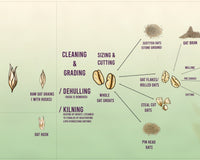Healthier eating, along with an overall healthier lifestyle, has become a topic of intense interest as incidences of diseases and conditions associated with sedentary lifestyles and poor diets continue to rise. Humans did not evolve to eat so much processed food, and scientists have come to understand better the harmful health effects of doing so. As an alternative to conventional American diets, many people who live in cities have turned to organic urban farming. As you'll learn in this article, urban farming does not just result in more wholesome dishes at the dinner table—the benefits extend well beyond the superior nutrition of the urban-farmed crops themselves.
Increases Food Security
The term “food desert” has become popularized in recent years to describe the unstable access to quality food that many people in cities experience. Often, city dwellers are unable to locate fresh produce and instead must rely on packaged food from convenience stores or fast food. This has huge health ramifications, including increasing obesity rates, lifestyle diseases, such as diabetes and even vitamin and mineral deficiencies, in some cases. The health effects of living in a food desert are particularly dangerous for children. A community garden in which members grow their own organic crops is a great way to deliver clean, fresh food to communities starved for nutrition.
Land Use
Living in a concrete jungle can be challenging. The landscape of an inner-city is vastly different from what our ancestors evolved in, meaning that it is quite unnatural. A strategically placed urban organic garden can replace some of that natural feel that many cities lack. Additionally, organic farming offers environmental benefits. For example, manure as fertilizer results in increased carbon levels in the soil and lower carbon levels in the air, allowing everyone to breathe easier in the carbon-choked atmosphere of most major cities. Manure injecting has many benefits over traditional manure applications. This term refers to the process of “injecting” manure into the soil to work as a fertilizer rather than spreading it across the surface of where you’re planting something. Research has shown that this technique results in cleaner air in areas where it is practiced.
Tighter Communities
Though you might live in an urban community, it’s easy to feel alone if you don’t know anyone. Community gardening is a great way to get neighbors outside, working in the dirt, and enjoying each other’s company. It can be a great way to make some new friends, especially if you’re new to the area. Social connections are needed now more than ever in our fast-paced, tech-obsessed world. An organic urban farm could be just the thing to get everyone together.
Organic urban farming might seem like a lot of work, but there are so many benefits to doing it. It’s a great way to make not only your body feel healthier but also to improve your relationships with those who live around you. For all these benefits and more, consider giving organic urban farming a try.
For all the organic food you can’t grow, check out our food cupboard!






